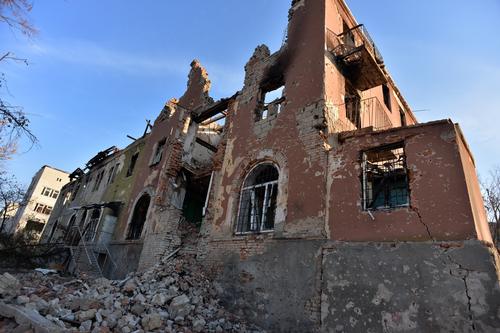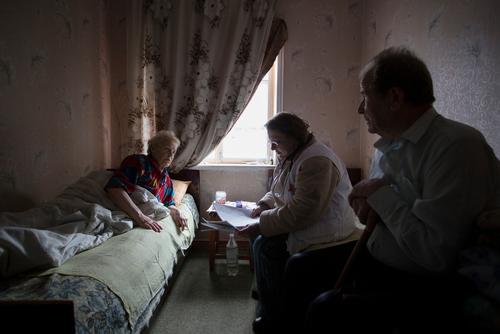With winter settling in in eastern Ukraine, Médecins Sans Frontières (MSF) is continuing its support to hospitals on both sides of the frontline, and expanding its psychological assistance to help people living in some of the hardest hit areas. Despite the signing of a ceasefire agreement on 5 September, fighting has continued in several cities and towns, with particularly heavy clashes taking place over the past two weeks.
In towns along the frontline in the Donetsk and Luhansk regions, shelling is ongoing and, in some districts, people have no option but to stay in basements or second world war-era bomb shelters for safety. Banks have closed and most people living in these areas do not have access to cash. Elderly and disabled people are particularly vulnerable, as they are finding it increasingly difficult to access healthcare and to buy medicines.
The 15 November announcement by the Ukrainian government that it would withdraw social services from the rebel-controlled areas, including halting all pension payments, will further exacerbate the difficulties faced by the most vulnerable people this winter. State support will also be cut to hospitals in the region, and doctors, nurses, social workers and other state employees have been told to evacuate these areas.
“More than six months after the conflict began, hospitals in Donetsk and Luhansk region are buckling under the pressure of dealing with thousands of wounded and displaced people,” says Stéphane Prévost, MSF head of mission in Ukraine. “Medical supply lines have been severely disrupted and in some cases cut completely. Hospitals have exhausted their budgets for 2014 and many medical staff tell us they have not been paid for months.”
Medical supplies
Since May, MSF teams have provided urgently needed medical supplies to 59 medical facilities on both sides of the frontline in Donetsk and Luhansk, enough to treat more than 10,250 wounded people. In response to critical shortages, we have also provided x-ray film, insulin, generators and surgical instruments to hospitals.
In addition to the ongoing need for supplies to treat wounded patients, MSF teams have also identified significant gaps in other general health services such as dialysis, maternal healthcare and the treatment of chronic diseases, including diabetes, hypertension, tuberculosis (TB) and HIV/AIDS. The longer the conflict continues, the more gaps there will be in the supply of medications, which will primarily affect patients with chronic diseases. Even when drugs are available, many people do not have access to cash to purchase them.
Psychological support
“People living in the conflict zone, as well as those who fled to safer areas, are exposed to traumatic events, such as shelling, shootings, and the loss of family members and friends,” says Prevost. “The sudden onset of this conflict means that people suffered an acute sense of loss at the destruction of their way of life, homes, jobs, and social and family networks. People are extremely anxious; they just don’t know what the next months hold.”
MSF psychologists are providing mental health support to those affected by the conflict in several cities on both sides of the frontline. Our teams provide individual, group and family psychological support, education about emotional reactions following traumatic events, and practical tools to help people cope with extreme fear, anxiety and nightmares. Since August, MSF teams have provided 764 individual and 60 group consultations to people affected by the conflict.
MSF psychologists are also running a training programme for local psychologists, social workers and medical staff working throughout the affected region to help improve their skills and avoid burn-out. Since August, they have carried out 303 training sessions, on topics such as psychological first aid, stress management and dealing with aggressive patients.
In addition to psychological support, MSF has also provided more than 1,800 hygiene kits including essentials such as soap, dental supplies, towels, blankets, baby food and nappies to people displaced by the conflict who have taken shelter in areas near the conflict zone. MSF teams have also distributed 15,000 warm blankets to hospitals and people living in precarious conditions in the Donetsk and Luhansk regions in preparation for the winter.
Continuing TB treatment in prisons
MSF has been running a drug-resistant TB treatment programme within the regional penitentiary system in Donetsk since 2011. Throughout the conflict, MSF has been making every effort to keep this project running and support patients to avoid treatment interruption, treatment failure and further drug-resistance. We are very concerned that the supply of medications to the penitentiary system in Donetsk is not functioning properly, raising concerns about the risk of prisoners developing further drug-resistance.





